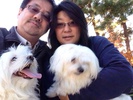Harvard Professor Larry Lessig Compares America’s Democracy to Hong Kong’s 「國際標準」 的民主?
Johnson Choi-1008 11/21 263915.0/2
Harvard Professor Larry Lessig Compares America’s Democracy to Hong Kong’s 「國際標準」 的民主?

Lessig compared the current state of voting in America to Hong Kong, where students have been protesting a new policy that will allow a small fraction of the population to choose the primary candidates in elections, after which point the general population will be able to vote. In other words, as Lessig put it, “it’s a two-stage process with a filter at the first stage.” The same was true, he says, in the American South after the Civil War, when black citizens could technically vote—but not until after the white primaries determined their options.
American democracy is controlled by a tiny minority of moneyed funders, Lessig believes, much as New York politics were controlled by political bosses during the 19th century. He likened Super PACs’ impact on Congress to that of Boss Tweed, the nineteenth-century New York senator who said he doesn’t “care who does the electing as long as I get to do the nominating.”
Lessig maintains that this is the same situation we find ourselves in today, pointing out that in 2012, 60% of Super PAC money came from just 132 donors.
To address major problems the country faces, such as environmental and tax reform, Lessig says reformers have to start with campaign finance, comparing the problem to alcoholism. “A guy could be losing his kidney, his liver and his wife, but he is not going to address any of those problems until he addresses his alcoholism.”
A people-funded Super PAC like Mayday, Lessig hopes, will work to elect a Congress dedicated to public funding of elections, thereby eliminating the power of Super PACs. Lessig says it will take fair-minded lawmakers from both parties to make publicly-funded elections a reality. Of the five candidates Lessig’s Mayday PAC is backing so far, three are Democrats, while two are Republicans. Of one, Rep. Walter Jones (R—N.C.), Lessig says, “He has lots of views that I find—I’m supposed to be polite here, right?—I find I don’t agree with. But Walter Jones has co-sponsored public funding of elections.”
And for Mayday, that’s all that matters.
「國際標準」 的民主? (美國哈佛大學法學院教授勞倫斯.雷席格 LawrenceLessig) 「佔中」源起於政改,不少「佔中」人士認為,香港人面前擺着的是一種不符合「國際標準」的假普選。佔領派詬病1200 人的提名委員會會首先篩選候選人,算不上真正的民主。是真是假,或者可以從美國哈佛大學法學院教授勞倫斯.雷席格(LawrenceLessig)的一次訪問中找到線索。 雷席格指出,香港有機會擁有的普選方式給美國帶來極大的啟示,而美國現行的選舉制度對政府行使職責造成侵蝕。在美國,候選人若想參與國會選舉,就必須有足夠的經濟能力,而這種經濟能力就取決於他們的資助者。如同香港的提委會首先在候選人上做了選擇,美國的選舉亦需經歷兩個步驟,資助者決定哪些候選人可在第二階段真正有效地參與競選,華爾街的金融大鱷是候選人的最主要金主。候選人花費大量時間游說金主出資支持自己,自然明白自己的行為將直接影響今天的籌款能力,而籌款的多少亦會影響自己是否能夠當上那個位置。所以,參選人的游說目標只是金主,不是民眾。 另一方面,捐助者拿錢出來的同時,當然會在稅收等一些政策法規上有所求。雷席格認為,當資助者為候選人準備好支票時,也已變相進入政策制訂過程,掌控未來的政策制訂。 試問在美國社會,有能力成為候選人資助者的所佔幾何?他們能代表最大多數美國人的利益嗎?答案是顯而易見的。雷席格估算,美國的選舉資助人大概只佔所有選民的0.05%,這些人決定了某些立法或改革,永遠不會真正在美國發生。 剝去層層外衣,原來為世界制訂所謂「國際標準」的民主老大哥的選舉,也不過是一場少數人的遊戲,美國標準下的民主,亦不過是少數人的民主。 反觀香港,1200人的提名委員會在人數上雖不算多,但在組成上卻涵蓋了香港四大主要界別,佔選民比率遠高於美國標準的0.05%,而相較美國標準以金錢決定候選人能否真正有意義地進入第二輪全民普選,香港的方式更能避免政府施政時向某單一群體傾斜。今天的佔領者不少來自基層,痛恨官商勾結,他們可會希望把美國式的標準套用於香港? (原文出自2014年11月21日信報)http://www.weidb.com/p10002



